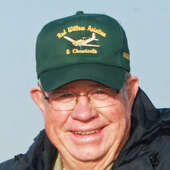- Sweatshirts, Jazzercise, and an unforgiving political climate (11/19/24)
- After the election: Lessons from history (11/5/24)
- Candy or cash: candidates and causes trick-or-treat for donations (10/29/24)
- You are fired! (10/1/24)
- Enduring heritage: Model T’s and Nebraska’s Unicam (9/24/24)
- YMCA project, coming changes and another attack (9/17/24)
- Class of '55 to share memories for Heritage Days (9/10/24)
Opinion
The opioid scourge
Tuesday, March 6, 2018
Several years back Grannie Annie was in the hospital recovering from her second hip replacement. A new procedure of applying a long lasting pain prevention medicine before closing the large incision was working well — she was experiencing minimal pain. A nurse, trying to be helpful, coached Grannie into swallowing a capsule of oxycodone even though Grannie the patient thought she didn’t need it. Holy moly the reaction was powerful, her head began to hurt and her vision blurred. She felt she was out of body and gazing down from afar. Then her stomach began to hurt and her bowels rebelled. She called for help and barely made it to the bathroom for relief. Never again was her vow to never ever swallow another one of those powerful pills.
On release from the hospital Grannie was issued a prescription for OxyContin in case she later would experience pain. She shredded that slip. She also took the several capsules that she had been given, just in case, and gave them to our local pharmacist to do with whatever.
In casual conversation with a friend recently he told Grannie that he takes one of those OxyContin capsules daily and it works to prevent pain in his legs. Another friend from grade school recently spoke of how he too takes OxyContin daily for some unspecified pain. Several years ago when first prescribed that medicine he found that it worked well for him. It raised somewhat of a red flag in his mind when his doctor informed him that he would never be able to get off the stuff. Humm no real problem, those prescribed pills are not very expensive as he only has to pay a small percentage of the cost as a co-pay the bulk paid by Medicare.
In the background on the daily news one reads of an opioid epidemic that seems to be sweeping our beloved country. Figures like opioid overdose deaths quadrupled from 8,050 in 1999 to 33,091 in 2015 and accounted for 63% of drug overdose deaths in the United States in 2015. During 2010–2015, heroin overdose deaths quadrupled from 3,036 to 12,989.
What then are opioids? I turned to Wikipedia for: Opioids include opiates, an older term that refers to such drugs derived from opium, including morphine itself. Other opioids are semi-synthetic and synthetic drugs such as hydrocodone, oxycodone and fentanyl. Opiate is properly limited to the natural alkaloids found in the resin of the opium poppy although some include semi-synthetic derivatives. Another source listed Opium, heroin, morphine and a universe of synthetic opioids, including the super powerful painkiller fentanyl as its proliferating offspring. More than a million Americans are now hooked on some kind opioid and drug overdoses—from heroin and fentanyl in particular—claimed more American lives last year than were lost in the entire Vietnam War.
Mankind has been using opium from the poppy for over 6000 years. Go down to the Museum in McCook and at the old pharmacy display one can find bottles labeled opium and laudanum from when it was sold over the counter to treat a variety of maladies for our pioneering forefathers.
The whole concept of drug addiction is strange to your columnist in part because I have lived my life in the aviation community. Pilots are reluctant to take any drug as doing so might affect the body in strange ways in the oxygen limited atmosphere of high altitude. Even the use of alcohol is forbidden twelve hours before any flight. Use of illicit drugs is a sure way to lose one’s license to fly.
Turning to an article written by one Andrew Sullivan who evidently has well researched the subject posits that due to the addictive properties of the drugs such as OxyContin when one takes the pill to relieve valid symptoms of pain, the brain likes the sense of euphoria and release of pain and after several doses craves the release again and again. You are addicted. Then when your prescription for the pain killer runs out you turn to the illicit drug market to obtain substitutes. Street heroin comes in unregulated strengths and the super powerful fentanyl, produced by labs in China can kill in even minute amounts.
Withdrawal from opioid addiction is evidently terribly difficult. Some of those symptoms are identical to what Grannie Annie experienced with her introduction to Oxytocin and vowed never again. Most likely withdrawal is much worse. When police or EMS find an addict collapsed on sidewalks or in restrooms they administer blasts of naloxone, a powerful antidote without which death rates would be even higher.
The author Sullivan states that this country needs to make a giant effort to find a cure for the epidemic and he suggests an action like what calmed the recent HIV AIDs epidemic. The antidote naloxone shows promise but it is a long and difficult process and has to be coupled with intensive psychological counseling.
Perhaps a better approach for us as individuals is to be careful to never be exposed to the products of the opium poppy in the first place. Oh the perils that our children, grandchildren and great grands face growing up in our county today. We need to do better.
That is how I saw it.

